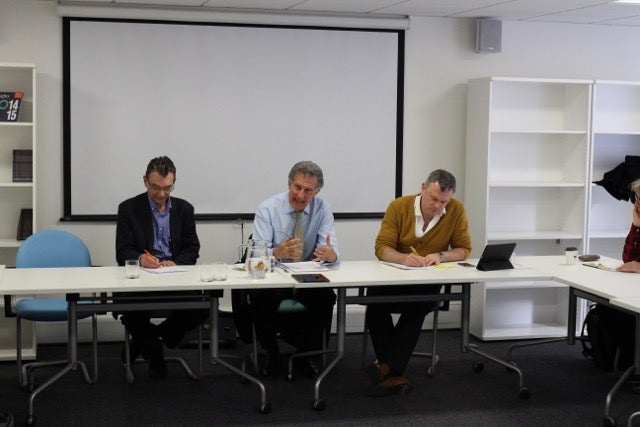Daily catch-up: Ministry of Defence mandarin on liberal interventionism
The Blair Years class at King's College, London, moves onto foreign policy, 1997-2001


Your support helps us to tell the story
From reproductive rights to climate change to Big Tech, The Independent is on the ground when the story is developing. Whether it's investigating the financials of Elon Musk's pro-Trump PAC or producing our latest documentary, 'The A Word', which shines a light on the American women fighting for reproductive rights, we know how important it is to parse out the facts from the messaging.
At such a critical moment in US history, we need reporters on the ground. Your donation allows us to keep sending journalists to speak to both sides of the story.
The Independent is trusted by Americans across the entire political spectrum. And unlike many other quality news outlets, we choose not to lock Americans out of our reporting and analysis with paywalls. We believe quality journalism should be available to everyone, paid for by those who can afford it.
Your support makes all the difference.Thanks to Sir Kevin Tebbit, former Permanent Under Secretary at the Ministry of Defence and visiting professor at the Policy Institute, King's College, London, for talking to our "Blair Years" students yesterday. The subject was liberal interventionism in Tony Blair's first term.
Sir Kevin, who was the top civil servant at the Ministry of Defence 1998-2005, reviewed the interventions up to 2001. Kosovo, Sierra Leone, East Timor (a small force under the Australians to secure East Timor's independence from Indonesia in 1999) and Iraq, particularly the US-British Desert Fox bombing campaign of 1998: "People tend to forget that Iraq was a continuous issue since 1990."
This represented a marked shift in foreign and defence policy away from the past. Of course it wasn't just about Tony Blair. All sorts of factors came together under the heading of liberal interventionism. There were new insecurities and challenges after the end of the cold war. By 1997 defence thinking was already changing. The first Gulf War in 1990 and the crisis in Bosnia in the mid-1990s taught policy-makers two lessons: the importance of working closely with the US and, in Bosnia, the dangers of leaving intervention too late.
New Labour had other reasons for wanting to be seen as reliable on national security, he said: the unpopularity of unilateral nuclear disarmament in the 1980s. They were determined not to let that happen again. "Mr Corbyn ought to be listening to this."
New Labour were also anxious to define national security in a way that distinguished themselves positively from the Conservatives. They felt the Major government had too narrow an idea of national self-interest, acting only to protect trade and immediate interests:
It was Robin Cook – not Tony Blair – who promulgated the idea that the interest of the international community is also our national interest. The example he gave was Afghanistan, which was quite ironic, really. He said ungoverned space in Afghanistan led to narcotics on the streets of Glasgow. And it was he who used the phrase "an ethical foreign policy". I was at the Foreign Office at the time and we said you never know where [such an open-ended phrase] might lead you. I kept trying to insert "dimension to", and he kept crossing it out.
However, there was a "Blair factor", said Sir Kevin. There was no doubt he was a conviction politician, particularly in foreign policy. He persuaded a reluctant President Clinton to threaten the use of ground troops in Kosovo, which was what finally forced Slobodan Milosevic to yield. The Chicago speech, delivered at the height of the Kosovo campaign in 1999, in which he said that we had learned twice this century that "appeasement does not work", and that "in the past we have talked too much of exit strategies", was a statement of his beliefs. "He said it and he meant it: the establishment, the Foreign Office and the Ministry of Defence, hardly knew it was coming. It was a surprise to the civil service when the Chicago speech came out that it was so strong."
However, Sir Kevin pointed out that Jack Straw, in his memoir, "says that if he'd decided to oppose Iraq it couldn't have gone ahead: you can overdo this idea of Blair in a unique role".
In discussion, Sir Kevin was sceptical of the idea that Blair's successes in foreign policy in his first term led to over-confidence in his second. "To the extent that he [Blair] may have been over-confident it may have been more about his ability to push the US into channels we wanted." He was keen to use British support in Iraq to promote the Middle East peace process, for example.
He added that it was true that the "military memory" was that the British had not lost a war. After the Second World War, we avoided Vietnam and succeeded in the Falklands. "So there was confidence, but I wouldn't call it over-confidence or hubris."
In his view 9/11 was "so cataclysmic that it changed everything". He said: "We still under-estimate the impact of 9/11 on the Americans. Donald Rumsfeld pulled bodies out of the Pentagon. That changed everything by lowering the threshold for the US." After 9/11 the US wanted to intervene to anticipate threats before they materialised.
Afghanistan and Iraq, however, are the subject of next week's class.
µ Sign up here to receive a daily "Catch-Up Service" email (9am Sunday to Friday) with links to new posts by John Rentoul.
Join our commenting forum
Join thought-provoking conversations, follow other Independent readers and see their replies
0Comments